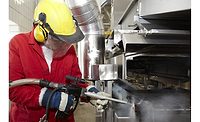Case Study: The Importance of Sanitation Training

Neco Foods is a manufacturer of soups, dips and seafood spreads/dips, as well as special brand products for retail. They also promote their own brand, Hope’s Kitchen. While the majority of their foods will be found in retail environments, such as supermarkets, they also sell to the foodservice company network.
Management commitment is imperative to the establishment of a culture that makes sanitation a priority. Neco recognizes the sanitation department as one of the most essential in a food manufacturing facility. They regularly assess the chemical and labor costs of their sanitation program. To control costs and quality, Neco applies the six-sigma quality/business methods of operation. With these controls in place, it is apparent that continuous improvement is important to the company.
Companies most committed to food safety invest in building a top-notch, sanitary production environment. Enhancing plant sanitation requires investing for the future and constant progress. The latest initiatives at Neco include taking a look at how to be more sustainable. Will Deckelmann, Quality Assurance Manager at Neco Foods says, “As a company, Neco Foods is well aware of the “sustainability” movement and views this as a work-in-progress commitment to make its contributions wherever possible within the facility.”
Asking the Right Questions
When Neco Foods began to reassess sanitation, they elected to take advantage of the resources available to them. Thus, a meeting that included their local sales representative, Chris Aromandi from Unisource, and Spartan’s local Regional Manager, Walter Cresswell, took place with the aim to improve upon Neco Food’s overall sanitation program.
Sanitation departments rely on an organization to be successful. This begins with a compelling sanitation manager and continues with the selection and training of sanitation team members who execute the sanitation methods properly. Just like all other roles in the plant, it is necessary to cross-train sanitation team members to ensure that they can perform in another role if needed. It is imperative to train them to perform the job properly, which includes safety training on personal protective equipment as well as chemical safety. The first step to improving Neco Food’s sanitation procedures was to assess the limitations that were in place, including analyzing current sanitation procedures, testing requirements and labor. A study of the current sanitation processes was observed, timed and assessed.
As this process began, the company also recognized the importance of adding management support from “top to bottom.” With regard to sanitation, Deckelmann reiterates, “It was important...to recognize that each member of the team has a role that contributes to the success of the company.” During the training process, they also identified three primary contaminants: microbiological (including pathogenic bacteria and spoilage microorganisms), chemical and physical.
As the company continued to assess their needs, wants and expectations, they used a fundamentalist approach, keeping things simple to minimize confusion. The following sanitation processes were examined:
• How to properly dry clean
• How to rinse a surface using the correct procedures
• How to apply detergent/cleaner in the proper manner
• How to rinse effectively and efficiently
• How to perform the proper application of the appropriate sanitizer
• How to ensure that chemical safety is in place
Neco Foods realizes that training is an ongoing process. Having easy access to their local supplier, along with local representation from Spartan, added to the ease of implementing their resources on a regular basis.
Spartan’s Walter Cresswell firmly believes that “food sanitation is not a ‘cookie cutter approach’. It takes team work and communication to put together a successful and effective program.”
“Partnering with the professionals at Spartan Chemical has expanded Unisource’s overall value proposition at Neco Foods,” states Chris Aromandi, Unisource Sales Representative. “Whenever Neco QA Manager Will Deckelmann has any technical, training or application issues, I know that Walter Cresswell and the Spartan team will provide prompt and effective solutions. If any mechanical issues arise, Unisource Service Tech Scott Deaquair keeps everything dispensing safely and accurately. This teamwork allows me to focus on the distribution elements required for seamless service. The individual and team commitment we provide Neco far exceeds anything the ‘direct sale’ competitors have to offer.”
Finding the Solution
Sanitation equipment, chemical selection and program design can have an influence on sanitation cost by decreasing the amount of chemical required to clean and sanitize while also reducing labor. Sanitary design makes cleaning quicker and efficient; the easier the plant is to clean, the faster the work will be completed. If a superior sanitary program is in place, the sanitation process will be more efficient, cost-effective and still prevent product adulteration, satisfying regulatory requirements as well as customers.
The training provided many benefits to Neco Foods, including no incidents of “non-compliance” at startup during their pre-operational inspections. There have been no injury claims for an extended period. Upon changing processes and procedures as identified during the assessment, the sanitation results included reducing man-hour/labor time in addition to a reduction in water usage. These reductions contributed to reducing “costs” and improving company efficiencies.
spartanchemical.com
Looking for a reprint of this article?
From high-res PDFs to custom plaques, order your copy today!






